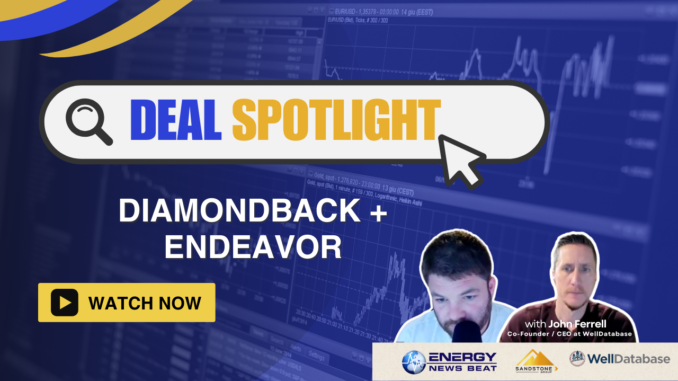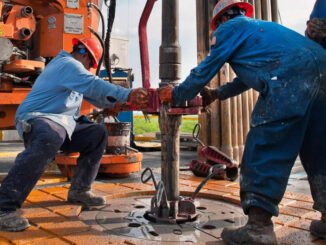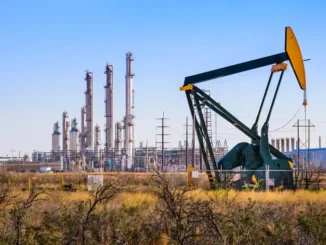
This is a Deal Spotlight with John Ferrell, Co-Founder / CEO at WellDatabase, and Michael Tanner. They cover great use of techniques in evaluating oil and gas deals. They even cover the Diamondback and Endeavor merger, potential mergers in the Permian, and other cool new developments.
We use WellDatabase on the Sandstone Group’s deal evaluations, saving us time and money. Check out WellDatabase HERE: https://welldatabase.com/
Follow John on his LinkedIn Here: https://www.linkedin.com/in/johnferrellsr/
Follow Michael on his LinkedIn Here: https://www.linkedin.com/in/michaeltannersandstone/
Check out https://survey.energynewsbeat.com/ and see what is coming around the corner as we expand services and products.
Highlights of the Podcast
01:43 – Analysis of Contiguous Acreage and Deal Valuation
04:03 – Transaction Overview and Synergy Assessment
06:09 – Comparison of Enterprise Values and Operational Integration
07:45 – High-Level Financial Analysis and Performance Metrics
10:00 – Evaluation of Financial Metrics and Economic Assumptions
17:01 – Analysis of recent oil production data
18:32 – Comparison of combined company’s value with peers
21:30 – Comparison of type curves and production performance
34:42 – Discussion on Diamondback and Endeavor merger
35:51 – Potential future mergers in the Permian Basin
41:10 – Evaluation of data analysis capabilities and future developments
Michael Tanner [00:00:10] What’s going on, everybody? Welcome into episode four of the Deal Spotlight. We are back highlighting Diamond Back and endeavor, the massive wrap up. Between those two pure play Permian operators. Really exciting stuff. We went ahead and gave Stu an episode off and brought in a great friend of the show, John Farrell. He’s the CEO and co-founder of, well database, the fastest growing, oil and gas public database, out there right now. I love World Database. And really what we are able to do in this episode is navigate almost all of the, of the sectors, and parts of this deal using specifically, well, database. It’s an awesome tool. I’m very glad John was able to come on. We cover a bunch of different stuff. I mean, first we find out they’re coming a lot of barrels real quickly. It’s one of the things we like about it. We kind of dive into to a lot of the the pure analysis that they talk about it. And overall it’s an awesome conversation. And really a great showcase of the power of what, well, database can do for you. I’d highly recommend checking them out. Well, database.com, anybody can get signed up for free. It’s what I love. Data is such the this you know people think data is expensive. People think data needs to cost so much. No no no no no. Go to well database. Get yourself a free account. You’re going to be able to get what you need. And then for for pennies on the dollar you’re able to upgrade and get access to us. Why data we love. Well database. We use it every single day. And I highly recommend checking it out. And I appreciate John joining us. I’m going to go ahead and toss it over to us. We’re going to cover Diamondback and Endeavor. We’ll see you next time. Well let’s go ahead and dive on in here. Super excited to break this down I mean that we you know John and I we’ve got the wells loaded up here. I think the you know, the first thing that pops off the page and obviously the first thing that they talk about in the in the press release is the contiguous acreage. I mean, if you want to talk about two companies sort of right on top of each other, you could not get a better match from an acreage standpoint than this.
John Ferrel [00:02:08] Oh, absolutely. Yeah. I mean, you guys a little bit off in the Delaware, from the Diamondbacks side, but, yeah, the core acreage, for endeavor and, in this Midland Basin area is just super tight. And you’re exactly right. This is a great, a great option for a merger to, you know, for operational reasons.
Michael Tanner [00:02:26] Yeah. I mean, I think I think that, you know, considering, you know, one thing and the reason why I want to focus on that to begin with is because that was the big thing that they were pushing. I mean, if you if you listen to the earnings call, you know, they were talking, the first thing they said was, hey, they’re right across the street from each other. We could throw a stone and hit their office. That’s how, you know, we were able to negotiate this and that. And that’s really good. And I think, you know, part of what I think when we when we look into this deal a little bit more, they’re going to be they’re playing that advantage card very heavily when we talk about some of the multiples. Because you got to look here, I mean $26 billion, it’s you know that’s the overall payment that they’re going to go ahead and start out with. And kind of the valuation they put on endeavor. I think the interesting part is going to be is when we can kind of look in here and break, okay, the difference between what that PDP and and possible valuation is. But I think the big high level takeaway here is the value is more is more on the combined overall value of what this company is then, versus some of the individual parts being picked out of endeavor, you know, specifically because of the fact that these guys are layered on top of each other and we’re now bringing endeavor into the public eye. That’s the other thing that I find super interesting about these private publics buying a private. So now we get all this information on endeavor that we were waiting around for years to find out.
John Ferrel [00:03:40] No, absolutely. You couldn’t be more. Right. And in a trend of the, the consolidation, there’s a very clear, correlation between growing your acreage and your multiple, for your market cap. And so it makes sense on both sides and, yeah, getting that data and combining them together. Yeah. There’s just it’s very clear that this is a nice, clean, merger.
Michael Tanner [00:04:01] Absolutely. So before we dive in here real quick, let’s go ahead and slow us. Load up slide five here. This is the transaction overview. So again $26 billion, 8 billion in cash. 117 million a stock. Gotta love that. If you’re, you know, well, also what that tells me is, is Audrey Stevens love. He still wants to be an oil and gas. Dude didn’t take cash. Guy took some stock. He sees some upside in this. So maybe we should do. The other interesting thing is, is you’re seeing the overlapping acreage. That’s 838,000 net acres and about 816,000, boe per day of net production. We’ll be able to kind of check a lot of this stuff out right here. This is a this isn’t the bullet point we’ll get into too heavily, but you’re talking I mean, 600 or 6100 locations between the two companies at break evens, a less than 40 WTI. Oh, I wish I had a few of those on my drilling plan, but, you know, they’re talking about annual synergies of 550 million. That kind of goes back to specifically, we talk about the overlapping acreage. You know, I think everybody and John, this is something you and I were talking about before we we popped on here was, you know, everyone talks about when they see that word synergies. Oh no lay offs. I’m not so sure if, you know, they go out of their way to mention, hey, that’s not where these synergies are coming from. A lot of it’s coming from kind of being able to apply best practices from both, companies. You know, they specifically go out of the way to talk about the simple fact that they’re doing, but it’s going to be interesting to see specifically if they’re able to achieve a lot of those synergy targets without necessarily looking at that headcount.
John Ferrel [00:05:38] Absolutely. I don’t think it’s avoidable when a merger that you’re going to have some level of redundancy, you’re going to work with. But again, I do believe that endeavor had seemed to have their choice of suitors in this area. And I if I had to take a guess at it, that that was something that they took heavily into account, that they were not going to come in and reduce headcount heavily. So, yeah, I think that plays in nicely. I think it’s it’s a nice, operational consistency so that you don’t have to just, I mean, day one, you can keep rolling and then, you know, changes can be gradual, if any. As we look into these, we’re going to see that these guys, they they play really nicely together. From an operational standpoint. So yeah, hopefully we don’t see a lot of redundancies in here. You know, optimizations, they get a lot of work to do, a lot of spots to drill. And so I don’t, I don’t think that they need to cut a ton of headcount. But and it’s kind of inevitable in these situations though it is.
Michael Tanner [00:06:28] And I think the last thing will point out is, is you look at that bottom right table there on slide five. I mean, you mentioned this before. I think this is B, you know, this is being pitched as an acquisition, but this really looks like a merger. I mean, you’re talking about enterprise values of 36,000,000,026 billion. For Diamondback and Endeavor respectively. I mean, that’s you know, you’re only talking about a $10 billion difference. You know, production is not terribly far off. You’re only got about 64,000, barrels of oil for Diamondback, only 60,000 a day. Some some wish they had that base decline. The same acreage about the same. Permian acreage the same. And then obviously those gross locations. But, I think that’s the first thing I want to dive. I’ve been here and look at John and specifically this. This is a merger more than it actually is an acquisition, even though it’s being pitched that way.
John Ferrel [00:07:16] Absolutely not. I mean, I do believe the numbers right down at around to 60, 40, on the stock side and with Diamondback stock. I think the jump near 10% on the announcement of this. And so I think that just lends to the whole fact that, really believe that people are viewing this as a, as a win win for everybody. And it is more of a merger than acquisition, for sure.
Michael Tanner [00:07:39] Yeah. No. So. Well, I think it’s let’s move. Let’s take a look real quickly at just some of these high level numbers here. I love this view that you guys have. It’s and this is one of the reasons I love your platform is you’re, you’re very easily able to say okay we need to now go especially in one of these transactions. You’re an investor trying to figure out what do I like this deal do I not? Do I buy Diamondback back stock? A lot of what you’ve got to do is go back, check a lot of the stuff that they’re trying to tell you because, you know, we run this on our podcast all the time. I, our guy of the week, they love to just throw numbers out there. Something like, well, database is the exact tool that’s needed to go back, calculate a lot of that stuff which we’re about to go do, which I’m excited for.
John Ferrel [00:08:18] Yeah, absolutely. So yeah, it’s starting at a very high level. You know, I think so much of the core acreage is going to be on the Midland side. But when we’re talking numbers, we’re going to be talking the complete, complete Permian assets. Now, there are some fringe assets that you, I think that will probably be spun off, to help appease regulatory bodies and things like that. So, something that I can’t imagine is going to get hung up too heavy when we just had, you know, I know Pioneer and Exxon are still rolling, but, I don’t yeah, that surely can’t be an issue. But just quick look here. You know, these are going to be your active producers across the entire Permian. You got Diamondback in 6700 wells and endeavor about 5600. When we look at the production here, we can see that Diamondback has been acquiring a number of targets over the past 4 or 5 years. And so you see some decent little jumps in their production. That’s mainly from acquisitions, whereas endeavors is mainly from drilling. And so that’s the thing to note here, because as we look at, comparing their operations,



